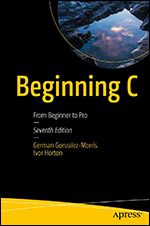Programming and Problem Solving with C++, Seventh Edition
- 34h 18m
- Chip Weems, Nell Dale, Tim Richardson
- Jones and Bartlett Learning
- 2023
Widely accepted as a model textbook for ACM/IEEE-recommended curricula for introductory computer science courses, Programming and Problem Solving with C++, Seventh Edition continues to reflect the authors' philosophy of guiding students through the content in an accessible and approachable way. It offers full coverage of all necessary content enabling the book to be used across two terms, and provides numerous features to help students fully understand and retain important concepts from each chapter.
Features and Benefits
- Problem-Solving Case Studies present a specific problem and use problem-solving techniques to develop a manual solution. It then expands the solution to an algorithm, using functional decomposition, object-oriented design, or both. The algorithm is then coded in C++ with full examples.
- esting and Debugging sections follow the case studies in each chapter and consider the implications of the chapter material with regard to the thorough testing of programs, along with testing and debugging hints.
- Quick Checks at the end of each section are questions that test the student's recall of major points associated with chapter goals.
- Exam Preparation Exercises help students prepare for their upcoming tests. The questions have objective answers and are designed to be answered with only a few minutes of work.
- Programming Warm-Up Exercises provide students with experience in writing C++ code fragments. Students can practice the syntactic constructs in each chapter without the burden of writing a complete program.
- Case Study Follow Up exercises give students an opportunity to strengthen their software maintenance skills by answering questions that require reading the case study code or making changes to it.
- Instructor Resources include a complete set of exercise answers, a Test Bank, slides in PowerPoint format, and the complete programs from the text.
About the Author
Nell Dale, PhD - University of Texas, Austin
Nell Dale received a B.S. in Mathematics and Psychology from the University of Houston, a M.A. in Mathematics, from the University of Texas at Austin, and a Ph.D. in Computer Sciences from the University of Texas at Austin. Nell Dale has been on the faculty at the University of Texas, Austin since 1975. She teaches occasionally but concentrates on computer science education, writing, traveling, tennis, and bridge -- and her family of course.
Chip Weems - University of Massachusetts, Amherst
Oregon State University in 1977 and 1979, respectively. He received a Ph.D. from the University of Massachusetts in 1984. Over the last 23 years, he has taught courses in introductory programming, software engineering, computer architecture, and parallel processing. Since 1986 he has co-authored 13 textbooks that have helped over a million students learn to program computers. His books have been translated into French, Spanish, and Russian. He conducts research in computer architecture, compilers, parallel processing, and compiler-architecture co-optimization.
Tim Richards - University of Massachusetts, Amherst, Amherst, Massachusetts
In this Book
-
Overview of Programming and Problem Solving
-
C++ Syntax and Semantics, and the Program Development Process
-
Numeric Types, Expressions, and Output
-
Program Input and the Software Design Process
-
Conditions, Logical Expressions, and Selection Control Structures
-
Looping
-
Additional Control Structures
-
Functions
-
Scope, Lifetime, and More on Functions
-
User-Defined Data Types
-
Arrays
-
Classes and Abstraction
-
Array-Based Lists
-
Dynamic Data and Linked Lists
-
Inheritance, Polymorphism, and Object-Oriented Design
-
Templates, Operator Overloading, and Exceptions
-
Introduction to Data Structures Using the Standard Template Library
-
Recursion




